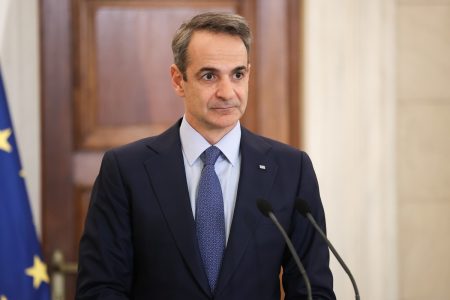The European Union summit today responded to Ankara’s hostile actions toward Greece and Cyprus – an item that was added to the agenda at the insistence of PM Kyriakos Mitsotakis and Cyprus’ President Nicow Anastasiades – with more admonitions and urgings to cease provocations but wthout taking the next step with the adoption of sanctions.
A large segment of the Greek media, pundits and opposition parties have for weeks been clamouring for the government push harder for sanctions but EU foreign policy decisions require unanimity and Germany and other countries firmly oppose that prospect, ostensibly in order to facilitate the start of Greek-Turkish exploratory talks.
Greek analysts often cite bilateral economic relations and the the huge trade between Turkey and the wealthier EU member states as the key reason for their reluctance to impose sanctions.
Prime Minister Kyriakos Mitsotakis said that at the summit raised the possibility of an arms embargo on Turkey, a proposal that is well nigh impossible to garner support from Greece’s EU partners.
The conclusions of the summit included two paragraphs on Turkey which clearly show that consensus favours the carrot rather the stick, even though the October 1-2 summit – which leaders reaffirmed today – raises the prospect of approving sanctions.
The relevant articles in the conclusions are as follows:
The European Council reaffirms its conclusions of 1-2 October 2020 and deplores renewed unilateral and provocative actions by Turkey in the Eastern Mediterranean, including recent exploratory activities. The European Council urges respect for UN Security Council
Resolutions 550 and 789, underlines the importance of the status of Varosha and reiterates its full solidarity with Greece and Cyprus.
23. The European Council urges Turkey to reverse these actions and work for the easing of
tensions in a consistent and sustained manner. It will remain seized of the matter in order to
follow-up on its conclusions of 1-2 October 2020.
Guarded optimism from Mitsotakis
Countries thaqt had envisaged a positive development regarding Turkey after the previous EU Summit on October 1-2 were «unpleasantly surprised by Turkey’s recent stance and the resumption of Turkish research vessel Oruc Reis’ maritime activity,» Mitsotakis told journalists a
However, the Greek premier expressed his hope that EU-Turkey relations will not reach a point when sanctions against Turkey will be necessary, but he warned that the «EU does have the decisiveness necessary to proceed with taking measures against Turkey that could be severe.»
Regarding the last-minute inclusion of the Turkish issue on the EU Summit’s agenda, he said that «Cyprus President Nicos Anastasiades and I insisted and demanded a clear reference that must indicate the EU’s strong disapproval of Turkey’s unilateral actions. The country leaders finally agreed to this. There is a clear reference urging Turkey to respect UN Security Council resolutions and calling on Turkey to reverse these actions, adding that it will monitor the developments.»
«When we discussed the issue of Turkey in detail at the last EU Summit, we had to cover a long distance to explain it to the Europeans. The conclusions that were reaffirmed today in paragraph 21 state clearly a time period in which Turkey’s behavior will be evaluated in December,» at that month’s EU summit meeting.
Asked by reporters if December is a reasonable deadline for an EU decision on Turkey, he said that reaching any conclusions requires a unanimous consensus as opposed to a majority position. He observed that Greece’s diplomatic maneuvering was «a struggle in and of itself» to achieve the EU’s current approach on the matter.
Greece is defending its national sovereignty and sovereign rights, he then said in response to whether Greece’s red line is the 6 or 12 nautical miles regarding Oruc Reis’ maritime activity in the Aegean Sea. He explained that Greece has already announced a decision to extend its territorial waters in the Ionian Sea from 6 to 12 miles,» and it has also «completed agreements with Italy and Egypt for the definition of maritime zones where the country exercises sovereign rights.»
Elaborating some more, he noted that «it is also known Greece defends its sovereignty at sea and air where our national airspace is 10 miles and any violation of it is dealt with by the Armed Forces.» He stressed that Greece «reserves the inalienable right to extend its territorial waters to 12 miles whenever and however it sees fit.»
Commenting on the persistent coronavirus pandemic, the Prime Minister said that «there is increasing concern over the second wave of the virus in all the European countries,» adding that although «Greece appears to still be one of the countries that is coping better in comparison with Western and Eastern Europe, this is something that can change at any time if we are not cautious and do not implement the measures.»
Mitsotakis also said that he raised the issue of preparation for the next spring and summer tourist period, noting that «we all hope that we will have the vaccine in the spring but we should be ready to travel with safety and common protocols». The Greek PM also revealed that inoculations against the flu were proceeding at a pace and over 1 million Greeks had been vaccinated so far, with the government having purchased over 4 million vaccines.
«It is also a great success for Europe that we have vaccine pre-purchase contracts, which, when available, will be distributed to member states,» Mitsotakis said. In addition, Greece he noted was one of the first European countries to purchase the fast-results test, which provide outcomes within half an hour instead of one or two days.
Speaking about the effect of the pandemic on the economies of the EU, he said that it was «imperative to not delay the implementation schedule of the EU Recovery Fund.» Discussion on ratifying the decisions reached in July should wrap up soon, he said, because further delays and worsening of economics will lead to a deeper recession in 2020.





